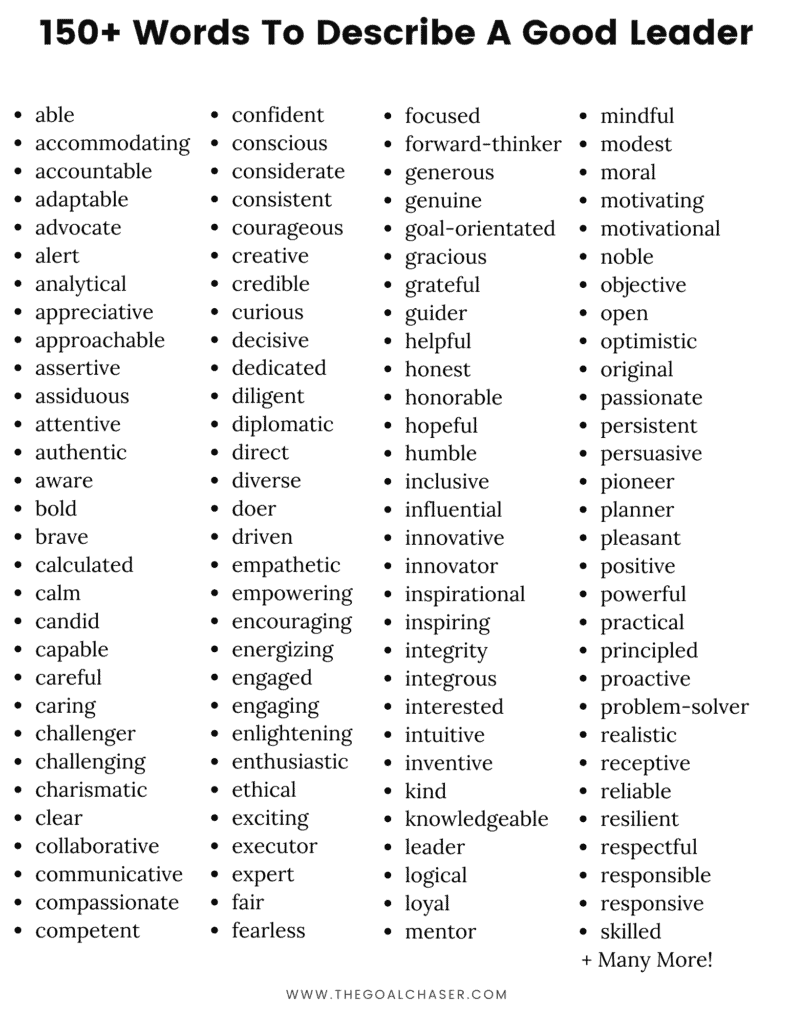Words To Describe A Leader – Good, Bad & Unique Leadership Adjectives
When we think of words to describe a leader, we often gravitate to words like ‘innovative’ or ‘influential’, ‘visionary’ or ‘challenging’.
However, in this article we delve into the many different adjectives we can use to describe both good and bad leaders, and discuss what makes a truly good leader in current times.

Words To Describe A Good Leader
We can describe a good leader as someone who possesses a combination of qualities and skills that inspire, guide and support their team effectively.
The following list includes characteristics and adjectives that help to describe a great leader:
- Able: Possessing the skills and capacity required to effectively lead.
- Accommodating: Willing to adjust or adapt to meet the needs of others.
- Accountable: Taking responsibility for one’s actions and decisions.
- Action-oriented: Proactively taking steps and making decisions to achieve goals.
- Adaptable: Capable of adjusting to new challenges and changing situations.
- Advocate: Actively supporting and representing the interests of others.
- Alert: Being aware of and responsive to current situations and changes.
- Analytical: Applying logical reasoning to solve problems and make decisions.
- Appreciative: Recognizing and valuing the contributions of others.
- Approachable: Being accessible and easy to talk to.
- Assertive: Expressing oneself confidently and directly.
- Assiduous: Showing persistent effort and diligence.
- Attentive: Paying close attention to details and the needs of others.
- Authentic: Genuine in one’s actions and intentions.
- Aware: Conscious of surroundings, situations, and feelings of others.
- Bold: Taking risks and making brave decisions.
- Brave: Facing challenges and difficulties with courage.
- Calculated: Making decisions based on careful consideration.
- Calm: Remaining composed and undisturbed in stressful situations.
- Candid: Being straightforward and honest in communication.
- Capable: Competent in performing tasks and responsibilities.
- Careful: Acting with caution and thought.
- Caring: Showing concern and compassion for others.
- Challenger: Pushing boundaries and questioning the status quo.
- Challenging: Setting high standards and pushing others to meet them.
- Charismatic: Possessing a magnetic personality that inspires others.
- Clear: Communicating in a straightforward and understandable manner.
- Collaborative: Working cooperatively with others towards a common goal.
- Communicative: Actively sharing and exchanging information.
- Compassionate: Showing empathy and understanding towards others.
- Competent: Being efficient and effective in one’s role.
- Confident: Having faith in one’s abilities and decisions.
- Conscious: Being aware of and considerate about the impact of one’s actions.
- Considerate: Showing thoughtfulness and regard for others.
- Consistent: Remaining steady and reliable in actions and decisions.
- Courageous: Facing fears and challenges head-on.
- Creative: Thinking outside the box and coming up with innovative solutions.
- Credible: Being trustworthy and believable.
- Curious: Eager to learn and understand new things.
- Decisive: Making firm decisions quickly.
- Dedicated: Committed to one’s duties and responsibilities.
- Diligent: Working hard with care and persistence.
- Diplomatic: Handling situations tactfully to avoid conflict.
- Direct: Communicating in a straightforward manner.
- Diverse: Valuing and incorporating a range of perspectives.
- Doer: Taking action and getting things done.
- Driven: Motivated to achieve goals and excel.
- Empathetic: Understanding and sharing the feelings of others.
- Empowering: Enabling and encouraging others to take initiative.
- Encouraging: Inspiring and supporting others to succeed.
- Energizing: Providing motivation and enthusiasm.
- Engaged: Fully involved and committed to tasks and responsibilities.
- Engaging: Captivating and holding the interest of others.
- Enlightening: Providing insight and clarity.
- Enthusiastic: Showing excitement and zeal.
- Ethical: Acting in a moral and upright manner.
- Exciting: Inspiring enthusiasm and interest.
- Executor: Effectively putting plans into action.
- Expert: Possessing extensive knowledge and skill in a specific area.
- Fair: Treating everyone equally and justly.
- Fearless: Not being deterred by challenges or threats.
- Focused: Concentrating on the task at hand without getting distracted.
- Forward-thinker: Anticipating and preparing for future needs and challenges.
- Generous: Giving more than is necessary or expected.
- Genuine: Being real and sincere.
- Goal-oriented: Working towards specific targets and objectives.
- Gracious: Being courteous and polite.
- Grateful: Showing appreciation and thankfulness.
- Guider: Leading and directing others on the right path.
- Helpful: Offering assistance and support.
- Honest: Being truthful and straightforward.
- Honorable: Acting with integrity and principles.
- Hopeful: Maintaining a positive outlook for the future.
- Humble: Recognizing and respecting the value of others without arrogance.
- Inclusive: Ensuring everyone feels involved and valued.
- Influential: Having the power to affect others’ actions and opinions.
- Innovative: Introducing new ideas and methods.
- Innovator: Someone who brings about or introduces new methods or ideas.
- Inspirational: Providing motivation and encouragement.
- Inspiring: Stirring emotions and stimulating action.
- Integrity: Acting with honesty and moral principles.
- Integrous: Possessing and sticking to strong moral principles.
- Interested: Showing genuine curiosity and concern.
- Intuitive: Understanding and sensing things without explicit reasoning.
- Inventive: Creating new ideas or solutions.
- Kind: Being considerate and gentle towards others.
- Knowledgeable: Possessing a wide range of information and understanding.
- Laborious: Putting in a lot of effort and hard work.
- Leader: Guiding and influencing a group towards achieving a goal.
- Logical: Using systematic reasoning to make decisions.
- Loyal: Remaining faithful and dedicated.
- Mentor: Advising and training others to help them grow.
- Mindful: Being conscious of and considerate about the present moment and its effects.
- Modest: Not boasting about one’s achievements.
- Moral: Following ethical principles.
- Motivating: Providing reasons for someone to act or behave in a certain way.
- Motivational: Encouraging others to take action or pursue their goals.
- Noble: Showing high moral qualities and ideals.
- Objective: Making decisions based on facts rather than emotions.
- Open: Willing to listen and consider new ideas.
- Optimistic: Expecting positive outcomes.
- Original: Introducing fresh and unique ideas.
- Passionate: Showing intense enthusiasm and care.
- Persistent: Continuing to act or believe in something despite challenges.
- Persuasive: Convincing others to see things from your perspective or to take specific actions.
- Pioneer: Someone who introduces or establishes new methods or ideas.
- Planner: Organizing and setting out steps to achieve specific goals.
- Pleasant: Being agreeable and delightful in interactions.
- Positive: Maintaining an optimistic attitude and outlook.
- Powerful: Possessing the ability to influence and make impactful decisions.
- Practical: Focusing on realistic and achievable solutions.
- Principled: Sticking to one’s values and ethics.
- Proactive: Taking initiative and acting in anticipation of future problems or needs.
- Problem-solver: Finding solutions to challenges or issues.
- Realistic: Seeing and planning for things as they truly are.
- Receptive: Open to feedback and new ideas.
- Reliable: Dependable in fulfilling responsibilities.
- Resilient: Recovering quickly from difficulties and setbacks.
- Respectful: Valuing and treating others with dignity.
- Responsible: Being accountable for one’s actions and commitments.
- Responsive: Reacting quickly and positively to situations or feedback.
- Serving: Putting the needs of others before one’s own.
- Skilled: Having specific abilities and expertise.
- Smart: Demonstrating intelligence and keen judgment.
- Steady: Being consistent and stable in actions and emotions.
- Stern: Firm and strict in one’s expectations or discipline.
- Steward: Managing and looking after resources or responsibilities.
- Straight-shooter: Being honest and straightforward in communication.
- Strategic: Planning with foresight to achieve long-term goals.
- Strong: Demonstrating mental, emotional, or physical strength.
- Supportive: Providing help or encouragement.
- Tactful: Handling sensitive issues with discretion and care.
- Teacher: Imparting knowledge and guiding others in learning.
- Thankful: Expressing gratitude and appreciation.
- Thinker: Reflecting deeply and considering various aspects of situations.
- Timely: Acting or doing something at the appropriate or right moment.
- Tireless: Having relentless energy and effort.
- Transformative: Making marked changes that bring about significant improvement.
- Transparent: Being open and honest, with no secrets.
- Trusting: Having faith in others.
- Trustworthy: Being reliable and deserving of trust.
- Unique: Having distinct qualities that set one apart.
- Upbeat: Maintaining a cheerful and positive demeanor.
- Uplifting: Inspiring hope and joy.
- Valuable: Being of great worth or utility.
- Vigilant: Keeping careful watch for potential dangers or challenges.
- Visionary: Thinking about or planning for the future with imagination and wisdom.
- Zealous: Showing great energy and enthusiasm for a cause or objective.
Words To Describe A Bad Leader
Bad leaders are those who lack the qualities and skills necessary to guide, inspire, and support their team effectively.
They often exhibit behaviors that undermine trust, stifle growth, and create a toxic work environment.
Here are some specific adjectives that can be used to describe a bad leader:
- Arrogant: Overly confident in one’s abilities to the point of disrespecting others.
- Bias: Favoring certain individuals or groups over others without justifiable reasons.
- Close-minded: Unwilling to consider new ideas or perspectives.
- Deceptive: Misleading or lying to others for personal gain.
- Disorganized: Lacking structure or planning in actions and decisions.
- Disrespectful: Not valuing or considering the feelings and rights of others.
- Distracted: Not paying attention to important issues or tasks.
- Egotistical: Believing oneself to be superior or more important than others.
- Erratic: Unpredictable and inconsistent in behavior and decisions.
- Impatient: Not willing to wait or give adequate time for processes or people.
- Impulsive: Acting without thinking or considering the consequences.
- Inattentive: Not giving proper attention to tasks or concerns of others.
- Incompetent: Lacking the necessary skills or knowledge for the role.
- Indecisive: Unable to make decisions confidently or promptly.
- Insensitive: Not caring about the feelings or needs of others.
- Irresponsible: Not taking ownership of actions or their consequences.
- Lazy: Unwilling to put in the necessary effort or work.
- Manipulative: Controlling or influencing others deceitfully for personal gain.
- Micromanager: Over-controlling tasks and not allowing others the freedom to work independently.
- Narrow-minded: Limited in outlook and unwilling to consider broader perspectives.
- Neglectful: Failing to care for or attend to duties and responsibilities.
- Opaque: Not transparent or clear in actions and intentions.
- Overbearing: Dominating or overwhelming in behavior, stifling others.
- Passive: Not taking action or showing initiative when required.
- Prejudiced: Holding irrational judgments or biases against individuals or groups.
- Reckless: Acting without concern for the consequences.
- Rigid: Unwilling to adapt or change even when it’s beneficial.
- Self-centered: Putting one’s own needs and desires above those of others.
- Short-sighted: Not considering the long-term consequences or benefits.
- Stubborn: Refusing to change one’s mind or perspective despite evidence.
- Unapproachable: Difficult to speak to or engage with.
- Uncommunicative: Failing to share important information or engage in open dialogue.
- Unethical: Not adhering to moral principles or professional standards.
- Uninspiring: Lacking the ability to motivate or enthuse others.
- Unreliable: Not dependable or trustworthy in actions and commitments.
- Vague: Not being clear or specific, leading to confusion.
Unique Words To Describe A Leader
Interested in a more ‘unique’ word to describe a leader?
Each of these words encapsulates a distinct aspect of leadership, and the most effective leaders often embody a combination of these traits:
- Visionary – A leader can see beyond the present, forecasting the future and creating a roadmap for their team or organization to achieve long-term goals.
- Empathetic – Leaders understand and resonate with the feelings and perspectives of others, ensuring team members feel understood and valued.
- Decisive – A leader makes firm decisions even under pressure, providing direction and clarity to the team.
- Adaptable – Great leaders can adjust to changing circumstances and new information, demonstrating flexibility and resilience.
- Integrity – Leaders uphold moral principles and act consistently with their words, fostering trust within the team.
- Inspirational – They motivate and uplift others, encouraging them to perform at their best and believe in a shared mission.
- Strategic – Leaders think critically about the bigger picture, considering multiple angles and potential consequences before taking action.
- Charismatic – With a compelling charm or influence, leaders can rally people around a cause, making others want to follow them.
- Collaborative – Recognizing that collective intelligence surpasses individual brilliance, leaders promote teamwork and harness the diverse strengths of team members.
- Courageous – They face challenges head-on and are unafraid to take risks or stand up for what they believe in, setting an example for others.
- Accountable – Leaders take responsibility for both their actions and the outcomes of their decisions, fostering a culture of accountability within the team.
- Egalitarian – They treat everyone as equals, regardless of rank or status, promoting a sense of unity and fairness.
- Diligent – Leaders are persistent in their efforts and show a strong work ethic, setting a standard for commitment and dedication.
- Innovative – Always on the lookout for new ways to solve problems or enhance performance, leaders foster a culture of creativity and continuous improvement.
- Listener – More than just hearing words, leaders truly listen to feedback, concerns, and ideas, valuing input from all sources.
What Makes a Good Leader?
What makes a good leader is a multifaceted question, as leadership encompasses a wide range of skills, qualities, and attributes. However, there are some qualities that can be attributed to any good leader:
- We want leaders who are fair; we don’t want people with too much ego or narcissism. It’s not about them – it’s about what they can do for the company and its employees.
- We want leaders who are respectful – this goes both ways, to colleagues and customers alike. We don’t want our leaders viewed as selfish or having an attitude of entitlement.
- We also want good listeners. There’s nothing worse than a leader who doesn’t listen to your ideas or opinions.
- We want leaders who are accountable for their actions; we don’t want people who make excuses or point fingers. We want them to take ownership of their mistakes and not ignore the fact that there is a problem.
When it comes down to it, we want trustworthy leaders.
With these qualities, a leader can inspire others to do great things together – which is ultimately what they’re there for.
What are Some Qualities of Good Leadership?
When we think of good leaders that we have had in the past, we tend to think of qualities such as honesty, integrity, and experience.
We want leaders to have the ‘street cred’ – the knowledge of the job and what the organization does, but we also want them to have the ‘people skills’ – we want to be able to trust them and know that they are leading the way for us.
Good leadership skills are essential for every level of business, whether you’re managing one person or several employees. If you’re in a leadership position, it’s your job to show your team members the right way to do things.
Interested in more leadership words, and reading more about workplaces, employees and leaders, be sure to check out:






